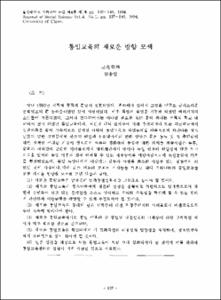자율적 환경규제의 유형과 한계
- Alternative Title
- Environmental ‘Self-regulations’: Types and Limits
- Abstract
- 최근 들어 유럽과 미국에서 환경보전과 오염감소를 위해 기업이 스스로 환경개선을 기울인다는 이른바 기업의 '자율규제'(self-regulation)에 대한 주장이 활발하게 전개되고 있다. 자율규제에 포함되는 구체적인 방법으로는 오염감소 '계약'(covenants), 오염권 거래, 제3기관의 증명, 환경개선 실적에 따른 규제의 융통성에 부여 등 매우 다양한 것들이 소개되고 있다. 기업의 자율적 환경규제에 대한 논의는 환경개선 노력이 기업의 이익이 될 수 있다는 기업의 인식 변화 그리고 기존의 정부개입에 의한 환경규제 방식의 비효율성에 대한 비판이 결합되어 등장하게 되었다.
이 논문에서는 여러 가지 유형의 자율적 ??경규제(environmental self-regulations) 수단들의 내용 및 이들의 장단점을 분석하였으며, 마지막으로 자율규제의 한계를 살펴보았다.
There is now active advocacy, in some business and governmental circles, of increased 'self-regulation' of business for environmental protection and pollution reduction. Specific proposals include sectoral pollution-reduction 'covenants', market trading of emissions permits, third-party certification of environmental performance, adhoc negotitaion of regulatoryflexibility in exchange for superior environmental performance. These proposals reflect two primarylines of argument. One is a growing literature on the 'greening of industry' and its benefits. The other line of argument is on criticisms against conventional government regulatory regimes. The combined effect of these arguments had been a variety of recent proposals and experiments to encourage increased environmental 'self-regulation' by business.
The purpose of this paper is to characterize the principal types of proposals for 'envionmental self-regulation', to clarify their strengths andweaknesses as approaches for achieving environmentally sustainable performances.
There is now active advocacy, in some business and governmental circles, of increased 'self-regulation' of business for environmental protection and pollution reduction. Specific proposals include sectoral pollution-reduction 'covenants', market trading of emissions permits, third-party certification of environmental performance, adhoc negotitaion of regulatoryflexibility in exchange for superior environmental performance. These proposals reflect two primarylines of argument. One is a growing literature on the 'greening of industry' and its benefits. The other line of argument is on criticisms against conventional government regulatory regimes. The combined effect of these arguments had been a variety of recent proposals and experiments to encourage increased environmental 'self-regulation' by business.
The purpose of this paper is to characterize the principal types of proposals for 'envionmental self-regulation', to clarify their strengths andweaknesses as approaches for achieving environmentally sustainable performances.
- Issued Date
- 1999
- Type
- Research Laboratory
- Alternative Author(s)
- Jung,Joon-Keum
- Publisher
- 사회과학논집
- Language
- kor
- Rights
- 울산대학교 저작물은 저작권에 의해 보호받습니다.
- Citation Volume
- 9
- Citation Number
- 1
- Citation Start Page
- 19
- Citation End Page
- 38
- Appears in Collections:
- Research Laboratory > Journal of social science
- 파일 목록
-
-
Download
 000002024937.pdf
기타 데이터 / 579.38 kB / Adobe PDF
000002024937.pdf
기타 데이터 / 579.38 kB / Adobe PDF
-
Items in Repository are protected by copyright, with all rights reserved, unless otherwise indicated.